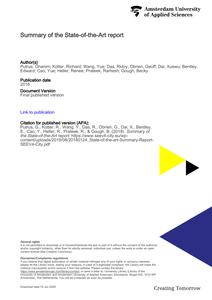Summary of the State-of-the-Art report for SEEV4city.
DOCUMENT

Online supplement to: Smit, E., Tuithof, H. & Béneker, T. (2023). Portraying the developing PCK of Dutch pre-service geography teachers. International Research in Geographical and Environmental Education.
DOCUMENT

During the Dutch Design Week 2020 (DDW2020), researchers of the project ‘Creative & Health Innovation Ways of Working Analysis’ (CHIWaWA) organized together with UCreate an online session on "Co-design in the 1.5 meter society", as part of the program "Embassy of Health" (World Design Embassies). In this online session, five guest speakers presented a case on how COVID-19 has changed the co-design approach in research and design projects. Three cases are Dutch projects in creative industry, and two are research projects from Eindhoven University of Technology.
DOCUMENT

In deze literatuurstudie werden vier databanken doorzocht met behulp van trefwoorden zoals chronic disease, e-health, factors en suggested interventions. Kwalitatieve, kwantitatieve en mixed methods-studies werden meegenomen. Uit de data van de 22 artikelen die werden geïncludeerd in de studie, blijken leeftijd, geslacht, inkomen, opleidingsniveau, etnische achtergrond en woonplaats (stad of platteland) in meer of mindere mate van invloed te zijn op het gebruik van e-health. Het artikel is een Nederlandstalige samenvatting van het artikel: Reiners, Sturm, Bouw & Wouters (2019) uit Int J Environ Res Public Health 2019;16(4)
DOCUMENT

Het tweejarige onderzoeksprogramma The Network is the Message richt zich op de effectiviteit van sociale media: wanneer zijn ze effectief, wat bepaalt die effectiviteit en hoe kunnen we dit meten? Startpunt in deze management summary fase 2B is het inzicht dat inhakers belangrijke dragers van brand content zijn, maar dat er ook nog een wereld te winnen is. Dit is nu niet direct een oproep aan alle merken om meteen met inhakers aan de slag te gaan; ‘inhaakmoeheid’ ligt op de loer. In deze management summary wordt beschreven wat goede inhakers zijn, wat een inhaker nou eigenlijk effectief maakt. We beschrijven de vier stappen die een rol spelen bij het ontwikkelen van kwalitatief goede inhakers.
DOCUMENT

On 16 September 2021 the Teacher Education Policy in Europe Network organized a webinar on career pathways for teachers. The reason for this theme was the need to explore how teachers can stay motivated in their profession during a longer time span. This motivation is key for retaining teachers in their profession, and key for learners in schools, as motivated and passionate teachers are better in supporting their learning.During the webinar, the focus was on the question how teacher career paths could support this long lasting motivation and wellbeing of teachers. As many countries are struggling with teacher shortage, the question how to retain teachers and how career opportunities can contribute to this, is of high importance.The webinar consisted of three parts. In the first part three keynote presenters explored the issue of teacher career paths from different angles. In the second part subgroups discussed issues and experiences and exchanged policy examples from different countries. In the third part, the outcomes of this exchange were collected and key issues for further exploration were identified, especially in relation to the role of teacher education.The summary ends with recommendations for different stakeholders.
DOCUMENT

No summary available
DOCUMENT
In Intellectual Output 1 of the SMILES project, researchers from Belgium (Flanders), Netherlands and Spain conducted desk research to describe the current developments for each country around disinformation, particularly those related to the Covid-19 pandemic. In part 2 of the research, they identified training initiatives, courses and media literacy training tools for each country that are specifically focused on the combat against or promotion of resistance to existing disinformation. Each identified activity or tool was characterised by a fixed set of characteristics (appendix 1). In the second stage of this research, some experts for each country were interviewed. Among other things, they were asked for recommendations and tips for interventions that will be developed in Intellectual Output 2 of the SMILES project. All research results were reported in separate country reports. This joint report lists the highlights of the separate country reports. It will end with recommendations for the interventions to be developed in Intellectual Output 2.
MULTIFILE
